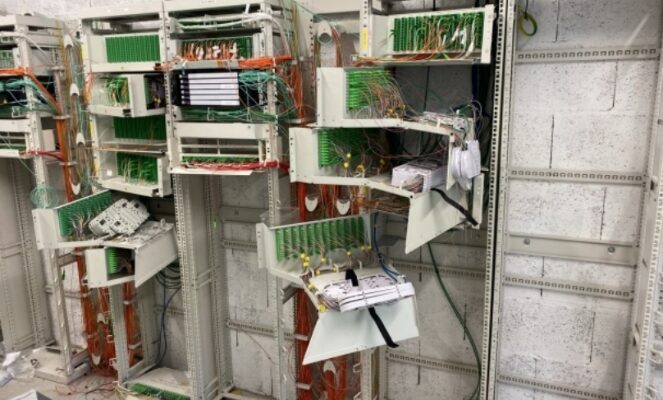118 degradations noted between June and December 2022. The Syane, the energy and digital development union of Haute-Savoie, keeps the sad count of the damage suffered by its fiber optic network. These are not acts of sabotage carried out by activists, but systematic degradations most often caused by subcontractors of telecom operators.
The doors of the fiber connection rooms are hooked, unhinged or destroyed with a crowbar. Inside, waste accumulates. There are reels of cables, but also food scraps and excrement. To alert public opinion to this endemic illness, elected officials from Haute-Savoie symbolically blocked, this Friday, February 24, the optical connection nodes (NRO) and the optical sub-distributors (SRO) in the communes of Fillière, Saint-Pierre-en-Faucigny, La Balme-de-Sillingy, Bons-en-Chablais and Saint-Julien-en-Genevois.
This widespread vandalism is not unique to this territory, which has invested 300 million euros since 2010 to build the infrastructure of the public initiative network. According to the latest report from the Electronic Communications Mediation, nearly half of disputes between fiber subscribers and operators relate to technical problems.
An “incomprehensible” and “ubiquitous” operation
The “punch” operation of the upper Savoyard communities is in fact akin to an acknowledgment of powerlessness. The Syane first put, in vain, pressure on its delegate, Altitude Infrastructure, to better manage the fiber optic infrastructure delegated to it. However, “the latter is in great difficulty to improve things in this area, because he does not have a free hand on the choice and control of the subcontractors who carry out the connections”, recalls the union.
The current regulatory framework allows private operators who market fiber subscriptions to impose themselves as subcontractors of the delegate, or to impose their own subcontractors. What is called in the fiber world the STOC mode, for “subcontracting by the commercial operator”.
In the vast majority of cases, it is the subcontractors of Orange, Free, SFR or Bouygues Telecom – or even the subcontractors’ subcontractors – who intervene in the field. Paid by the line connected, they do not hesitate to force access to technical rooms, but also to carry out unauthorized disconnections. That is to say disconnect an existing subscriber to connect a new home to the fiber.
For the elected officials of Haute-Savoie, “this operation generates unbearable, incomprehensible, even ubiquitous side effects. Their repercussions are ruining the image of the development of optical fiber in France, and in particular of public action”. While “optical fiber is a chance for our territories”, even “essential in localities which still suffer from insufficient ADSL speeds”, it is “urgent to act to maintain the quality of the network”.
Change the law, regulate the use of subcontracting
After having questioned in vain the Prefect, the parliamentarians, Jean-Noël Barrot (Delegate Minister in charge of the Digital Transition and Telecommunications), the elected officials and the Syane ask to change the law and to ensure that “the taxpayer does not not have to pay for the repairs of these damages”, to regulate the use of subcontracting, or even to prohibit “operators’ access to the public network when they do not do what is necessary to stop these damages “.
Senator of Ain and president of Avicca, an association representing communities, Patrick Chaize tabled a bill on July 19, aimed at “compelling operators to make fiber optic connections in accordance with the rules of the art and security, and thereby guarantee consumers their right to a quality internet connection”. It will be read in the Senate during the spring.
In its recent strategic plan, InfraNum, a professional union bringing together the various players in the chain – operators, integrators, equipment manufacturers, etc. – called, after the deployment at a sustained pace of fibre, for a consolidation phase with an emphasis on quality of service and network resilience.
While the telecom sector submitted an action plan to improve the quality of fiber networks last September, Arcep says it is vigilant about its execution by ensuring monthly monitoring. The Authority intends to control the operations carried out in the field and ensure that the agents intervening with customers or on the networks are well qualified and trained.


